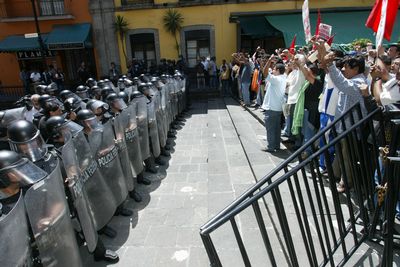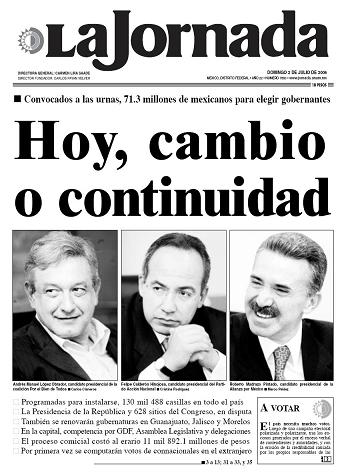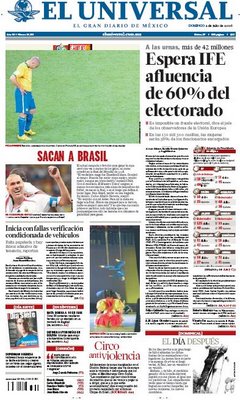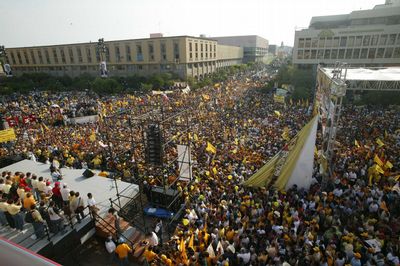Well, there’s not much since campaigning officially ends tonight. The vote is Sunday. Did you know that alcohol is not sold on election day in Mexico? Interesting, huh?
Now that Mexico’s out of the world cup, my Google “Mexico” newsfeed has regular news again, though I can’t say I’m happy about it.
Early in the day, Reuters and Bloomberg were pointing out that Mexican stocks opened low, but by tonight, both were commenting on the overall rise in stocks today.
La Jornada dedicated three stories to a claim by a Mexican journalist that the PAN has used voter registration information target their campaign:
El martes pasado, la periodista Carmen Aristegui denunció que el PAN realizó -con base en el padrón- su propio mapa de georreferencia para identificar a ciudadanos por nombre, apellido, dirección y hasta preferencia electoral, con el fin de utilizarlo en su campaña. Tal operación se pudo descubrir al ingresar a la página de Internet de las Redes por México, de Calderón, con el usuario hildebrando 117 y la contraseña ”captura”. De acuerdo con la legislación electoral, los partidos sólo pueden utilizar el padrón para revisarlo. Cualquier otro uso constituye un delito.
The PAN’s response was to claim that it was a trick by the PRD to make the PAN look bad:
”No caeremos en las provocaciones del Partido de la Revolución Democrática (PRD). Con mentiras no ganarán la Presidencia de la República”, aseguró la dirigencia nacional que preside Manuel Espino, cuando se le solicitó una entrevista sobre el eventual uso ilegal del padrón. Inclusive anunció que el tema no formará parte de la agenda político-electoral y de paso advirtió a los periodistas que “no esperen ningún comentario sobre las empresas de Diego Zavala”. [both quotes from the first article above]
The IFE has said it would investigate and that only 192 people have legal access to the voter rolls.
The leftist Mexico City daily is continuing to fan the flames of claims that social spending funds are being used for electoral purposes. This time, they claim to have thier own evidence pointing to PAN mischief. La Jornada is also continuing to criticize perceived inaction by Ugalde (the head of the electoral institute) to stop the CCE spots.
And, last but not least, just when we thought the teachers’ strike in Oaxaca was cooling off, things turn for the worse. (see also)

Of course, if you read the other Mexican dailies, you’re likely to get rosier, or at least less biased, news about the national Mexican futbol team or the closing rallies of the campaigns.







